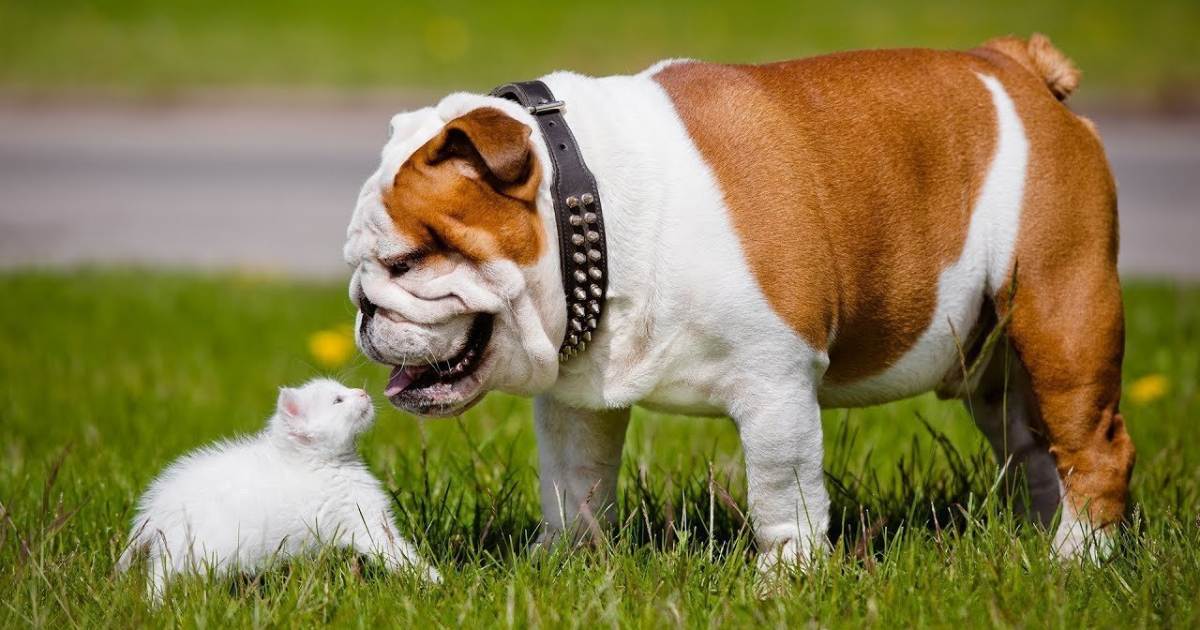The English bulldog is one of the most recognizable dog breeds in the world. With their characteristic pushed-in faces, muscular bodies, and sweet dispositions, these pups have charm and personality. Read on to learn more about the history, temperament, and care of this beloved breed.
History of the English Bulldog
The origins of the English bulldog can be traced back to 13th century England. They were originally bred to participate in the bloody sport of bull-baiting, where dogs would attempt to bite and bring down cattle. Their squat, muscular builds and extreme tenacity made them well-suited for this brutal event.
When bull-baiting was outlawed in 1835, the original bulldog breed was almost lost. Dog breeders focused their efforts on transforming the fierce fighter into a gentle house pet. Through careful breeding, the bulldog we know today emerged.
The English bulldog made its first appearance at a show in Birmingham, England in 1860. The breed gained significant popularity in the United States in the 1890s. They continue to be a favored companion dog known for their loyalty and lovable temperament.
Physical Characteristics

English bulldogs have a distinctive appearance characterized by their heavy build, wrinkled face, and undershot jaw.
- Size: Medium-sized breed, ranging from 40-50 lbs
- Body: Thick, wide chest and stocky body with a short tail
- Head: Large head that is flat on top with loose skin forming wrinkles
- Muzzle: Short muzzle with wrinkled folds and a pushed-in nose
- Ears and Eyes: Rose or button ears. Dark, wide-set eyes.
- Coat: Short, straight coat that comes in various colors like red, fawn, white, and brindle
One of the bulldog’s most notable features is its pushed-in face, known as a brachycephalic head. The bulldog’s undershot lower jaw coupled with loose facial skin gives them their signature frown. These physical traits can lead to respiratory issues, which requires special care.
Temperament and Personality
Despite their tough appearance, English bulldogs have a gentle and calm disposition.
- Affectionate: Extremely loving and emotional. Forms strong bonds with their people.
- Gentle: Patient and friendly. Great with children.
- Relaxed: Low energy. Content with short walks and quality napping sessions.
- Playful: Keeps a puppy-like silliness well into adulthood.
- Courageous: Known for bravery and guarding instinct.
Bulldogs crave human companionship and don’t do well when frequently left alone. They will thrive in a family environment with plenty of attention and playtime.
Training and Care
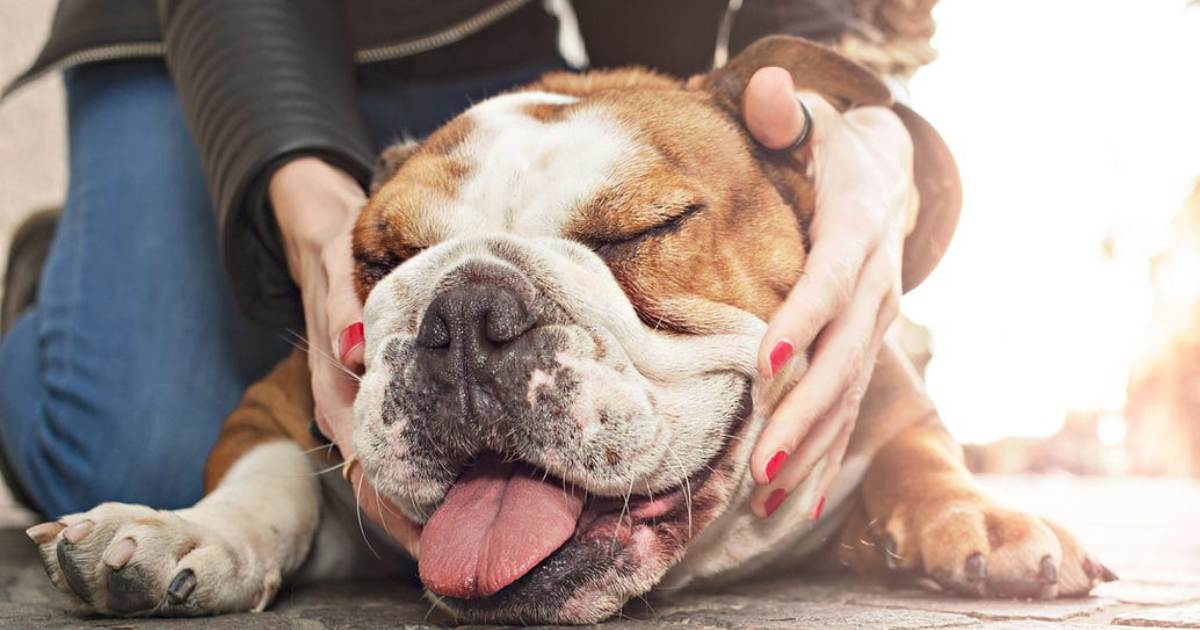
English bulldogs can be a bit stubborn, so patient, positive reinforcement training works best. Use rewards like treats and praise to motivate them during short, frequent sessions. Being a brachycephalic breed, bulldogs are sensitive to heat, humidity and vigorous exercise. Keep activities low-impact and supervise them outside in warm weather. Grooming is easy thanks to the bulldog’s short coat. Just brush them weekly and clean their facial folds. English bulldogs tend to drool.
Feed a high-quality dog food and avoid overfeeding, as bulldogs can become overweight. Their wrinkled skin also requires diligent cleaning. With an average lifespan of 8-10 years, bulldogs are prone to certain health conditions, like breathing issues, joint problems and skin infections. Regular vet checkups are a must.
Finding an English Bulldog
Interested in adding one of these adorable pups to your family? Be sure to find an ethical, responsible breeder. Avoid pet stores or online sites selling dogs. Visit breeders in person to meet parent dogs and inspect facilities. Expect to pay $1,500 to $5,000+ for an English bulldog from a reputable source.
Adoption is also an option. Check local shelters and breed-specific bulldog rescues. An adopted adult bulldog skips the puppy stage but still offers the same wonderful companionship.
The Bottom Line on English Bulldogs
The English bulldog has come a long way from its bull-baiting past. While their history is bloody, these dogs now have a reputation for being chill, affectionate pets. Their distinctive appearance and lovable personality make them a popular choice for families.
With proper exercise, frequent vet care, and a lot of love, the English bulldog makes a delightful addition to most homes. Their iconic “sourmug” face and stocky body contain a huge heart. For the right owner, these pups will provide years of grunts, snorts and companionship.
Key Facts about English Bulldogs
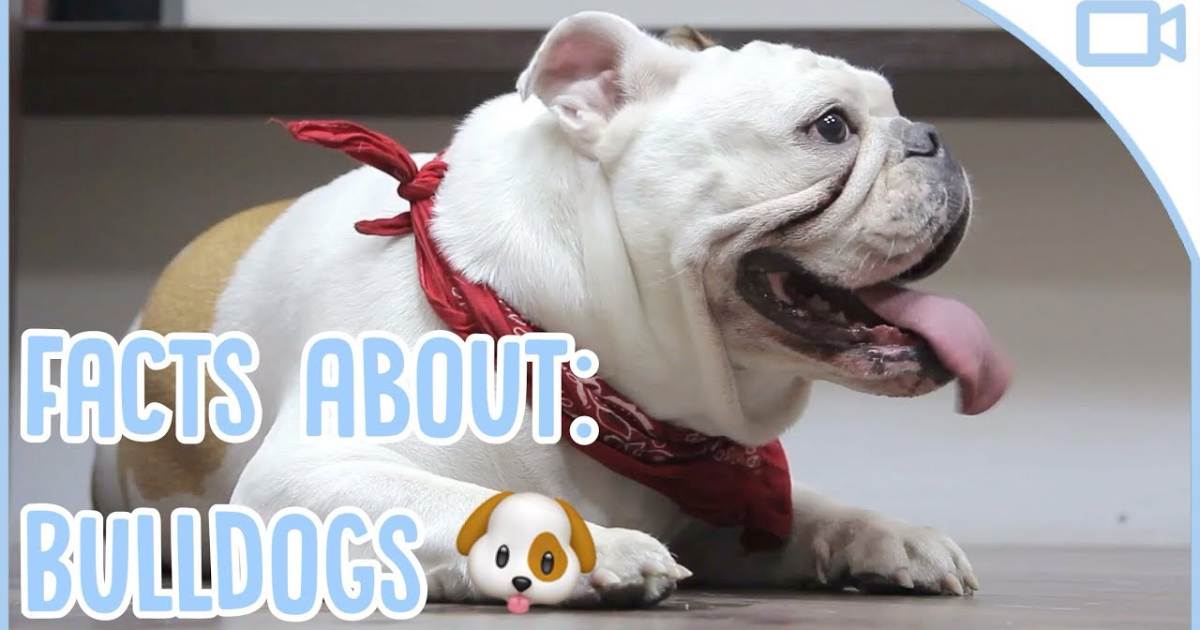
| Description | Details |
| Origins | England, originally for bull-baiting in the 1300s |
| Size | Medium, 40-50 lbs |
| Lifespan | 8-10 years |
| Coat | Short, straight, various colors |
| Temperament | Friendly, gentle, relaxed, loyal |
| Activity Level | Low, short daily walks |
| Best Home | House with yard, family around often |
| Grooming | Weekly brushing, face fold cleaning |
| Trainability | Moderate, responds best to positive reinforcement |
Caring for an English Bulldog Puppy
Bringing home an English bulldog puppy is an exciting time! Here’s a guide to caring for bulldog puppies so you can give them the best start in life:
Feeding
- Feed a high-quality puppy food formulated for medium or large breed dogs
- Serve scheduled meals 2-3 times per day
- Use a consistent feeding schedule and avoid free-feeding
- Monitor growth and adjust portions to maintain a lean body condition
Training
- Start training the moment your puppy arrives home
- Use positive reinforcement methods like food rewards and praise
- Focus on potty training, crate training, basic commands, and socialization
- Keep sessions under 10 minutes since bulldog puppies have short attention spans
- Be patient and consistent. Bulldog puppies can be stubborn.
Exercise
- Puppy exercise should be gentle and minimal
- Several short 10-15 minute walks per day are ideal
- Avoid strenuous play or anything that causes labored breathing
- Supervise outdoor playtime in shady areas
- Bulldog puppies are prone to overheating
Grooming
- Brush coat 1-2 times per week with a soft brush
- Clean facial folds daily with a damp cloth
- Check and clean ears weekly
- Start handling paws, teeth and nails early to acclimate puppy
- Bathe when dirty using a gentle puppy shampoo
Health
- Schedule vet appointments for vaccinations and checkups
- Discuss breed-specific concerns like respiration, joints, and allergies
- Feed a high-quality diet and avoid obesity
- Don’t over-exercise puppy due to heat sensitivity
- Monitor for signs of breathing trouble
- Keep the puppy in a climate-controlled area
Caring for a new English bulldog puppy takes time and diligence. Put in the effort during these formative months to set your pup up for a long, happy life as a family companion.
Common Health Issues in English Bulldogs
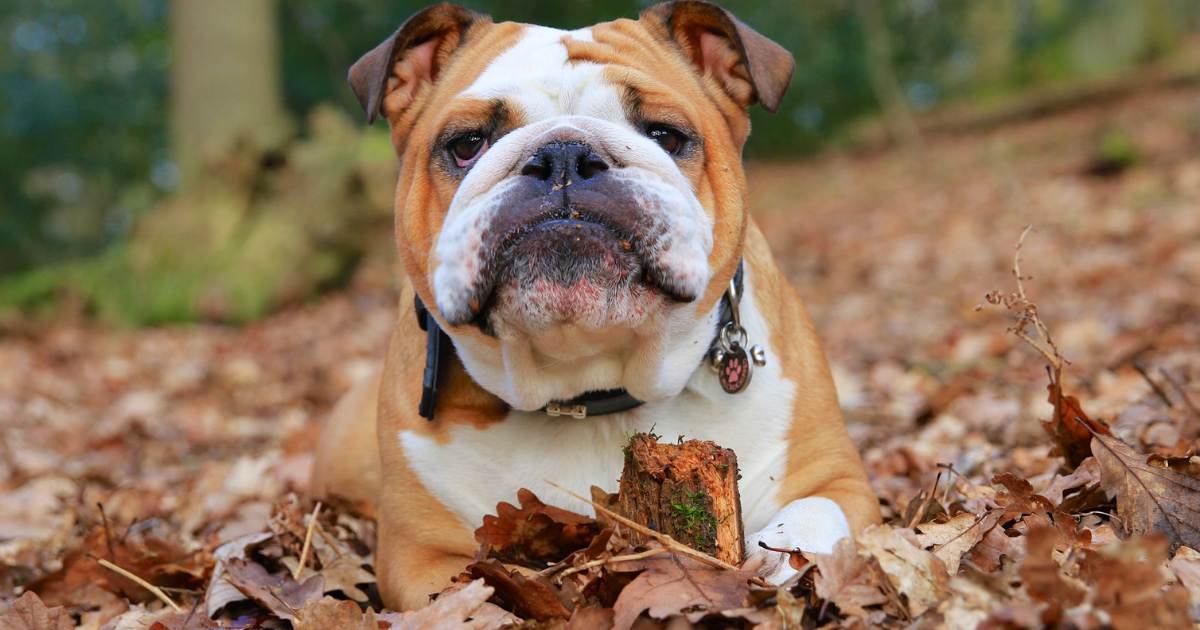
While English bulldogs make fabulous pets, they are prone to certain health conditions. Here are some of the most common health issues seen in this breed:
Respiratory Problems
The bulldog’s signature short muzzle causes breathing issues, especially in warm humid weather. They can experience:
- Brachycephalic Syndrome: Obstructed airways and difficulty breathing. Requires surgery in severe cases.
- Elongated Soft Palate: Extra tissue blocking airways. Corrected via surgery.
- Stenotic Nares: Pinched nostrils that require surgical widening.
Bulldogs with serious respiratory issues may require an air-conditioned environment and medication.
Skin Infections
Excess wrinkles on the bulldog’s face makes them prone to skin fold dermatitis. Signs include redness, odor and discharge around facial folds. Keeping folds clean and dry is important. Infections must be treated with medication.
Joint Problems
The bulldog’s stocky frame often leads to orthopedic issues like:
- Hip Dysplasia: Misaligned hip joint causing pain and arthritis.
- Elbow Dysplasia: Elbow joint deformity that requires surgery.
- Luxating Patellas: Dislocated kneecaps.
Joint issues may be managed with medication, therapy, or surgery. Keep bulldogs slim and limit jumping.
Eye Issues
Bulldogs’ prominent eyes are vulnerable to conditions like:
- Cherry Eye: Prolapsed third eyelid gland requiring surgical tacking.
- Entropion: Eyelids rolling inward and irritating the eye. May necessitate surgery.
- Ectropion: Eyelids sagging outward, causing irritation. Corrected surgically.
Heat Sensitivity
Bulldogs cannot tolerate heat or strenuous exercise due to their brachycephalic design. Take precautions to prevent overheating and breathing distress. With dedicated care, most bulldogs live happily with their conditions. Working closely with a vet helps manage any health issues that may arise.
Fun Facts About English Bulldogs
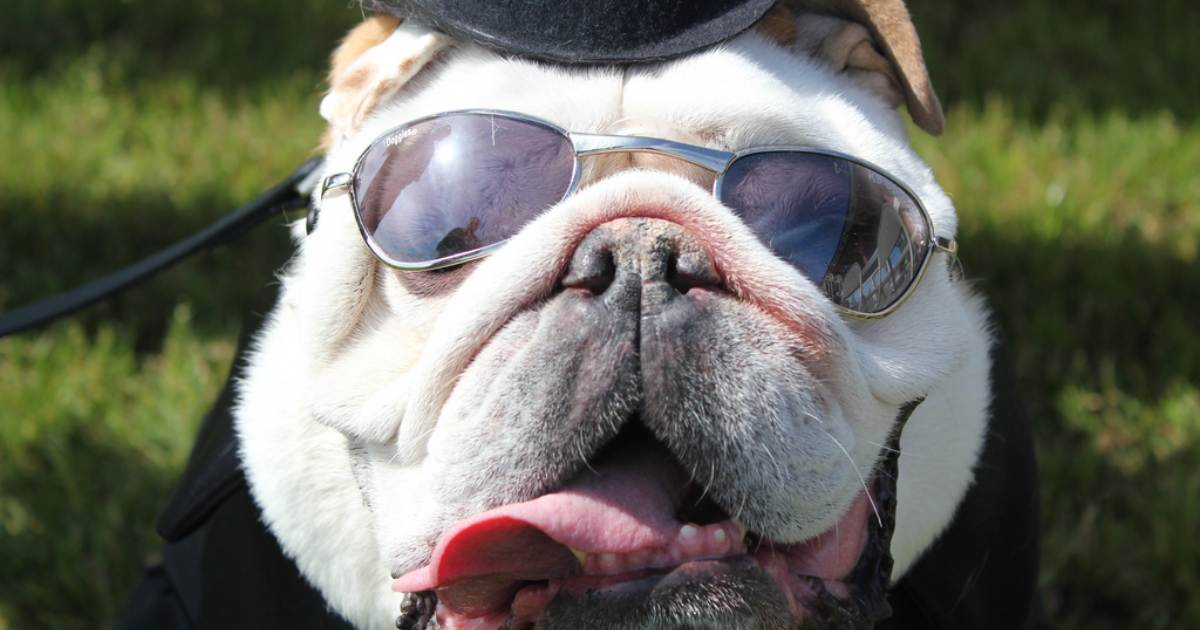
Beyond their cute mug and squishy face, here are some fun facts about the one-of-a-kind English bulldog breed:
- Bulldogs cannot swim due to their dense, front-heavy build and short muzzle. Life jackets are required!
- Their famous “side-eye” scowl comes from their undershot jaw and wrinkled brow.
- They were named #4 most popular dog breed by the American Kennel Club in 2022.
- Winston Churchill famously owned an English bulldog named Dodo.
- Male English bulldogs are called “dogs.” Females are “bitches.”
- They are the mascot of 39 American universities including Georgetown, Butler, and Yale.
- English bulldogs usually can’t conceive or give birth naturally due to their head size. Caesarean sections are common.
- An English bulldog named Tillman held the Guinness World Record for “Fastest Skateboarding Dog” in 2013.
- English bulldogs were almost extinct by World War II until revival breeding programs bounced back the population.
- Because of inbreeding, English bulldogs are prone to health problems. Mixed breed offspring like Bullboxers (Boxer/Bulldog) are often healthier.
Despite difficulties reproducing, English bulldogs remain one of the most iconic breeds to this day. Their trademark grumpy mug and sweet personality make them a pop culture staple.
Why Choose an English Bulldog?
For the right owner, English bulldogs can make an excellent companion pet. Here are some top reasons why someone may choose this breed:
Laidback Temperament
English bulldogs are famously relaxed, low-key, and adaptable to many lifestyles. They don’t require intense exercise and are content snoozing on the couch.
Great with Kids
Bulldogs tend to be gentle, friendly, and tolerant of children. They’ll happily join kids on the floor for playtime.
Minimal Grooming
Thanks to their short coat, bulldogs only require weekly brushing and the occasional bath. They shed moderately.
Protective Nature
Bulldogs bond closely with their families and exhibit courage if they sense danger. They make vigilant watchdogs.
Compact Size
English bulldogs stay under 50 pounds, making them a good choice for those with limited space. They can live comfortably in apartments.
Trainability
While stubborn, English bulldogs respond well to positive reinforcement training. Food motivation helps offset their independent streak.
For experienced dog owners who can accommodate their health needs, English bulldogs can be a delightful family companion.
Is an English Bulldog Right for Me?
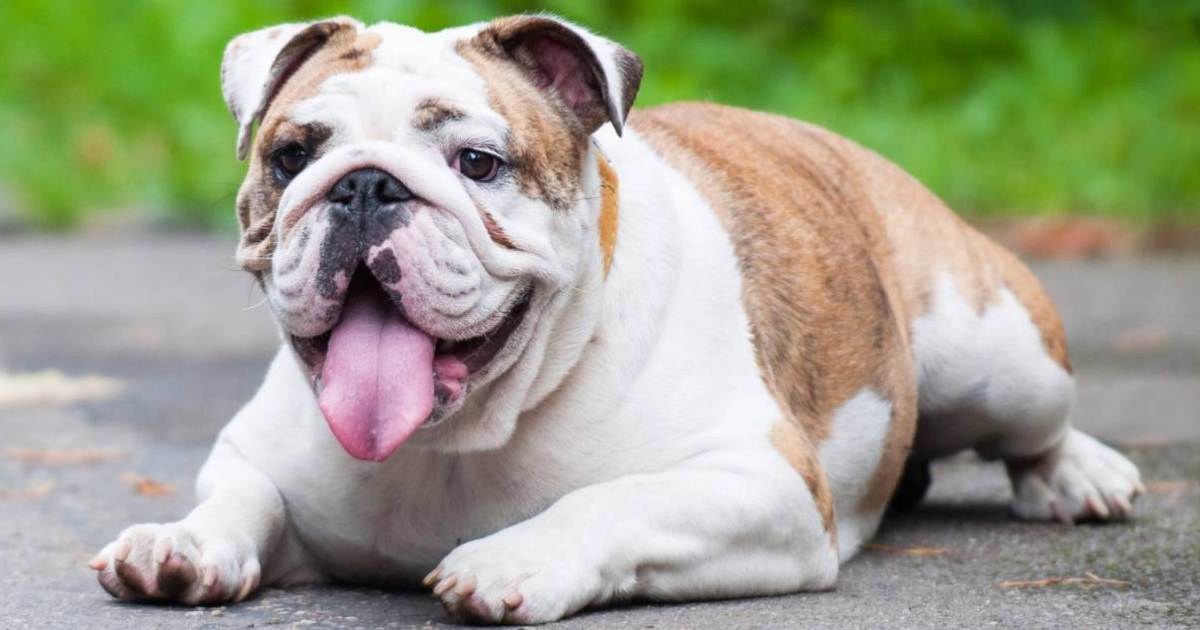
English bulldogs have many endearing traits, but they aren’t the right fit for everyone. Consider these factors to decide if an English bulldog is suitable for you:
Activity Level
Bulldogs are couch potatoes. If you want a running or hiking buddy, this isn’t the breed for you. They prefer leisurely ambling and quality naps.
Health Considerations
Bulldogs are prone to breathing issues, joint problems, and heat sensitivity. Are you prepared to provide vet care and lifestyle adjustments?
Grooming Needs
Bulldogs require frequent face wrinkle cleaning along with weekly brushing. Are you able to keep up with their hygiene needs?
Training Style
These dogs can be stubborn. Do you have the patience for positive reinforcement training? Bulldogs need dedicated socialization too.
Barking Level
Bulldogs make alert watchdogs and will bark at disturbances. If you need a quiet dog, this may not work.
Special Needs
English bulldogs often require artificial insemination and c-sections to reproduce. Are you comfortable with this?
Separation Anxiety
Bulldogs are prone to separation distress. If no one is home all day, this breed will require changes.
Lifespan
The bulldog’s average life expectancy is just 8-10 years. Are you prepared for a short time together?
Really take time to research the English bulldog’s personality and needs. An honest assessment will tell you if this dog suits your lifestyle.
Finding a Reputable English Bulldog Breeder

If you decide an English bulldog is right for you, finding a responsible breeder is crucial. Here’s how to identify a reputable source:
- Ask for referrals from veterinarians and breed clubs.
- The facility should be clean, spacious and enable socialization. You may meet parent dogs.
- The breeder focuses on health and temperament, not just conformation.
- They belong to bulldog breed organizations and registries.
- All health tests are performed on parent dogs, including X-rays, DNA, and more.
- The breeder is knowledgeable about bulldogs and asks you many questions too.
- They socialize puppies in their home environment and provide starter training.
- Contract will include health guarantees, spay/neuter terms, return policy, etc.
- No puppies sold to pet stores, wholesalers, or brokers.
Avoid any breeder who seems focused on profit above all else. Finding an ethical, conscientious breeder takes patience and research, but it’s worth it.
Questions to Ask a Bulldog Breeder
When interacting with potential English bulldog breeders, come prepared with questions:
- How long have you been breeding bulldogs?
- What health and temperament testing do you perform?
- Can I see where the puppies are raised and meet the parents?
- What type of health guarantee do you provide new owners?
- Do you require spay/neuter contracts for companion puppies?
- Do the puppies have experience interacting with adults, children, other dogs?
- What type of socialization and puppy training do you do?
- What is the pedigree background of your bulldogs?
- May I contact your veterinarian for a reference?
- Do you belong to any breed clubs or organizations?
- How often do you breed your dogs?
- What support do you offer new puppy owners?
A quality breeder will welcome such questions. Make sure you feel comfortable with the answers before committing.
Preparing Your Home for an English Bulldog

Before bringing home your new bulldog, take time to properly puppy-proof your abode:
Puppy Proofing
- Remove small objects or toxins. Bulldogs put everything in their mouths!
- Block access to delicate items like shoes or table legs.
- Secure cabinets, trash cans, medications, houseplants, and more.
- Tack down rugs and cords to prevent tripping hazards.
Containment
- Designate a confinement area like a crate, pen, or dog-safe room.
- You’ll need to restrict access until housebroken. Use baby gates.
- Ensure the containment area is comfortable with bedding, water, and toys.
Climate Control
- Bulldogs cannot tolerate heat or humidity.
- Make sure there is air conditioning to keep your home cool.
- Have fans circulating air in your dog’s main areas.
Comfort
- Provide plush dog beds around the house for napping and lounging.
- Consider ramps to help bulldogs access furniture or the bed.
- Keep food and water bowls on a raised stand for easy eating.
With preparation, you can make your bulldog feel right at home from day one!
Final Thoughts
The English bulldog is a very special breed of dog. Bulldogs are known for their pushed-in faces and stocky bodies. They have lots of loose skin that forms wrinkles on their heads. English bulldogs are friendly, calm, and loyal pets. They make great companions for kids and adults.
Originally from England, the bulldog was bred to fight bulls. Now they are gentle family dogs. Bulldogs can have some health problems so they need special care. Their flat noses make it hard to breathe sometimes. Overall, English bulldogs are good pets for people who understand their needs. Their cute faces and happy personality make them one of the most popular breeds. The English bulldog is a wonderful dog for the right family.

